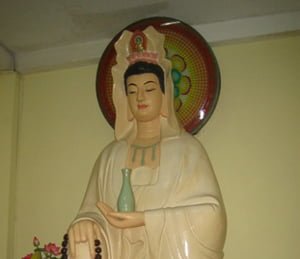


In Vietnamese, Sakyamuni Buddha - the historical Buddha - is known as Thich Ca Mau Ni Phat. He is the principle figure in most temple shrines. I often wonder about this, as most Mahayana Buddhists in Vietnam have Amitabha and Kwan Yin as the central focus of their worship. And yet Sakyamuni remains as the central figure of physical reverence and the object of chanting and repentance.
Monastics take on the name Thich as their family name once they enter the monastery - Thich being the first part of Sakyamuni's name, thus signifying their leaving their earthly families and entering the family of the Buddha.
The naive Buddhist art of Vietnam is dying out now.
 Once upon a time each town could boast of a small workshop that made quite primitive looking plaster statues of the Buddhas. These have almost disappeared from the shops,and people favour the more expensive, mass-produced porcelain figures manufactured in China.
Once upon a time each town could boast of a small workshop that made quite primitive looking plaster statues of the Buddhas. These have almost disappeared from the shops,and people favour the more expensive, mass-produced porcelain figures manufactured in China.Temples will also often feature a large statue of the infant Sakyamuni.
 More properly this figure should be called the Bodhisattva, as he was yet to achieve enlightenment, but most simply call him the Baby Buddha. This statue comes into its own during the festival of Vesak (Phat Dan), the celebration of the Buddha's birth, when it becomes a special focus of devotion.
More properly this figure should be called the Bodhisattva, as he was yet to achieve enlightenment, but most simply call him the Baby Buddha. This statue comes into its own during the festival of Vesak (Phat Dan), the celebration of the Buddha's birth, when it becomes a special focus of devotion.


No comments:
Post a Comment